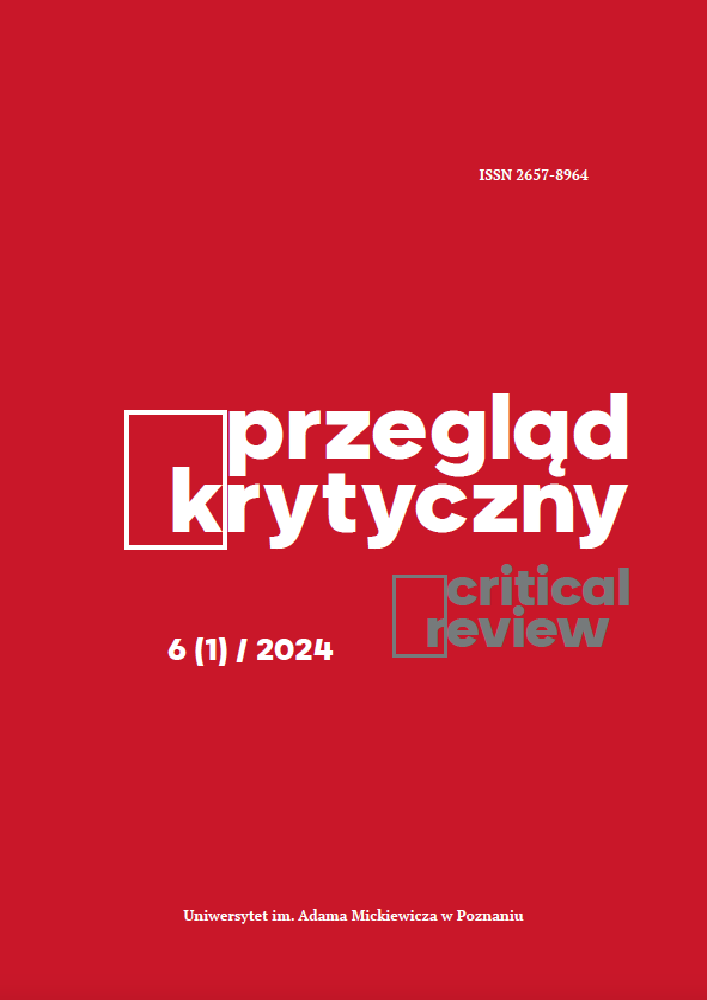Abstract
Gáspár Miklós Tamás has been one of the best-known Hungarian intellectuals and critics of the policies of the Victor Orban government in recent years. His analysis of the phenomenon of the migration crisis was reflected in his concept of “post-fascism”. It is difficult to understand it without reference to his other works and a systematic reconstruction. The article problematises this notion in the perspective of the Hungarian philosopher’s broad historisophical narrative, in which nationalism, ethnicism, fascism and post-fascism are shown to be successive stages in the contradictory development of post-Enlightenment capitalist liberal democracy. His political thought in this context is a call for the restoration of a class perspective in the analysis of social relations.
References
Bozóki, A. (2012). Opozycja demokratyczna na Węgrzech: Dyskusje programowe. Wolność i Solidarność, 3, 118-135.
Eco, U. (1999). Wieczny faszyzm. Pobrane z: https://mirror.anarhija.net/pl.anarchistlibraries.net/mirror/u/ue/umberto-eco-wieczny-faszyzm.pdf
Griffin, R. (1991). The Nature of Fascism. New York: Saint Martins Press.
Fraenkel, E. (2017). The Dual State (tłum. J. Meierhernich). Oxford: Oxford University Press. DOI: https://doi.org/10.1093/acprof:oso/9780198716204.001.0001
Frenyó, A. (2023). In memoriam Gáspár Miklós Tamás, aka TGM, the harshest oppositional voice respected even by Orbán. Pobrane z: https://cz.boell.org/en/2023/02/06/in-memoriam-gaspar-miklos-tamas
Jäger, A. (2023). The Prophet of Post-Facsism. Pobrane z: https://www.newstatesman.com/ideas/2023/01/gaspar-miklos-tamas-prophet-post-fascism
Kornai, J. (1985). Niedobór w Gospodarce (tłum. U. Grzelońska, Z. Wiańkowska). Warszawa: Państwowe Wydawnictwo Ekonomiczne.
Kozyr-Kowalski, S. (1998). Mikroklasy i makroklasy społeczeństwa. W: J. Włodarek (red.), Między przeszłością a przyszłością: Szkice o socjologii i społeczeństwie polskim w dobie przemian ustrojowych (ss. 115-130). Poznań: Wydawnictwo Naukowe UAM.
Marszał, M. (2012). Faszyzm i jego oblicza. Pobrane z: https://wwww.bibliotekacyfrowa.pl/Content/41100/PDF/02_Maciej_Marszal.pdf
Piasek, P. (2021). Psychologiczna struktura faszyzmu a informacyjna struktura postfaszyzmu. Humanistyka i Przyrodoznawstwo, 27, 151-172. DOI: https://doi.org/10.31648/hip.7484
Rysiewicz, M. (2010). Gdy prawo ustaje i wkracza siła… Stan wyjątkowy w myśli prawnopaństwowej Carla Schmitta. Dialogi Polityczne, 13, 77-93. DOI: https://doi.org/10.12775/DP.2010.005
Stone, D. (2018). On neighbours and those knocking at the door: Holocaust memory and Europe’s refugee crisis. Patterns of Prejudice, 52(2-3), 231-243. DOI: https://doi.org/10.1080/0031322X.2018.1433038
Szeman, I. (2009). The Left and Marxism in Eastern Europe: An Interview with Gáspár Miklós Tamás. Mediations, 24(2), 13-34. Pobrane z: https://mediationsjournal.org/articles/the-left-and-marxism-in-eastern-europe
Tamás, G. (1991). A Farewell to the Left. East European Politics and Societies, 1, 92-112. DOI: https://doi.org/10.1177/0888325491005001006
Tamás, G. (1994). A Disquisition on Civil Society. Social Research, 61(2), 205-222.
Tamás, G. (1999). The Legacy of Dissent. W: V. Tismaneanu (red.), The Revolutions of 1989 (ss. 177-192). London: Routledge.
Tamás, G. (2000). On Post-Fascism. East European Constitutional Review, 48, 48-56.
Tamás, G. (2008). A Capitalism Pure and Simple. Left Curve, 32, 66-75.
Tamás, G. (2015). The Meaning of the Refugee Crisis. OpenDemocracy, 21.09.2015. Pobrane z: https://www.opendemocracy.net/en/can-europe-make-it/meaning-of-refugee-crisis/
Tamás, G. (2016). Ethnicism after Nationalism: The Roots of New European Right. Socialist Register, 52, 118-135.
Tamás, G. (2017). Marks o 1989 roku (tłum. M. Rauszer). Praktyka Teoretyczna. Pobrane z: https://www.praktykateoretyczna.pl/artykuly/gaspar-miklos-tamas-marks-o-1989-roku/
Tamás, G. (2020). Socjalizm nie zawiódł, ponieważ nigdy nie wcielono go w życie. Krytyka Polityczna, 4.06.2020. Pobrane z: https://krytykapolityczna.pl/swiat/gaspar-tamas-socjalizm-kontra-faszyzm-europa-wywiad/
Tamás, G. (2023a). Counter-Revolution against a Counter-Revolution. Grundrisse, 23. Pobrane z: http://www.grundrisse.net/grundrisse23/counterRevolutionAgainstCounterRevolution.htm
Tamás, G. (2023b). Telling truth about the class. Grundrisse, 22. Pobrano z: http://www.grundrisse.net/grundrisse22/tellingTheTruthAboutClass.htm
Traverso, E. (2020). Nowe oblicza faszyzmu (tłum. Z. M. Kowalewski). Warszawa: Wydawnictwo Książka i Prasa.
Verseck, K. (2023). Zmarł Gaspar Miklos Tamas, najzacieklejszy krytyk Victora Orbana. Pobrane z: https://www.dw.com/pl/zmar%C5%82-gaspar-miklos-tamas-najzacieklejszy-krytyk-viktora-orbana/a-64420948
Ziegler, D. T. (2021). The Anti-Enlightenment Tradition as a Common Framework of Fascism and the Contemporary Far Right. Fascism, 10(1), 16-51. DOI: https://doi.org/10.1163/22116257-10010001
License
Copyright (c) 2024 Damian Winczewski

This work is licensed under a Creative Commons Attribution-NonCommercial 4.0 International License.
W przypadku zakwalifikowania tekstu do druku Autor wyraża zgodę na przekazanie praw autorskich do tego artykułu wydawcy (zob. Polityka open access). Autor artykułu zachowuje prawo wykorzystania treści opublikowanego przez czasopismo artykułu w dalszej pracy naukowej i popularyzatorskiej pod warunkiem wskazania źródła publikacji.


